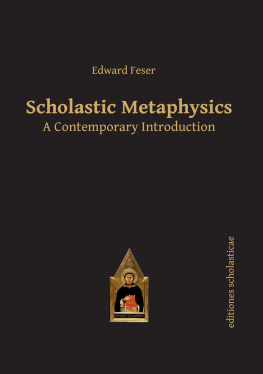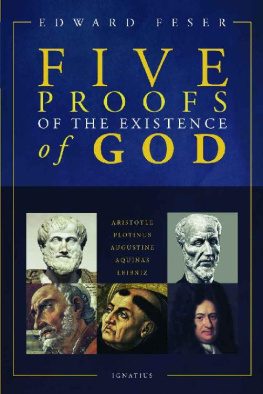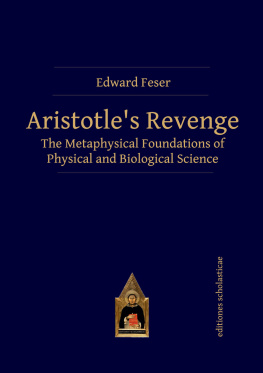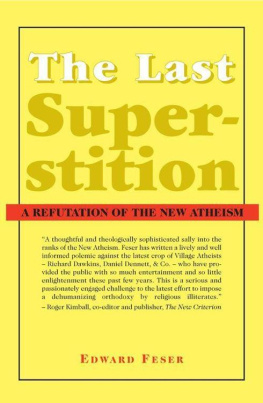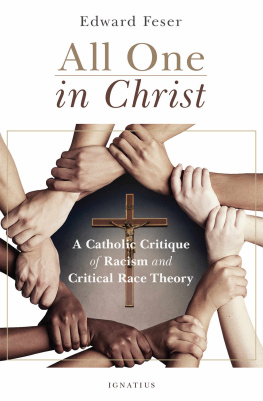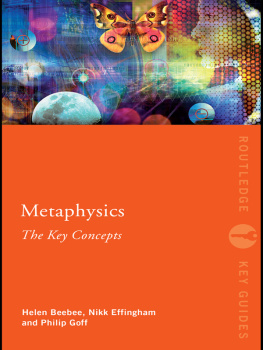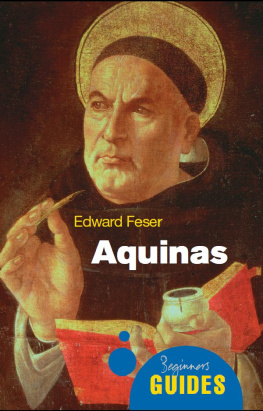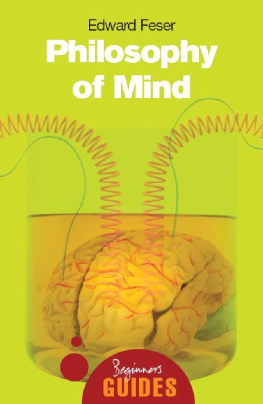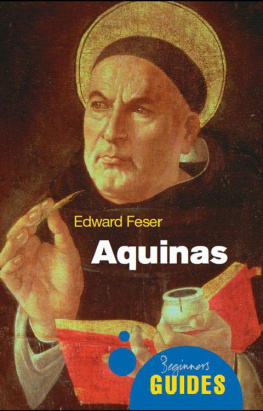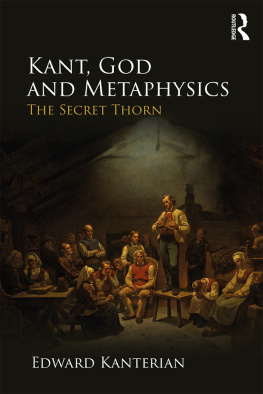Edward Feser - Scholastic Metaphysics
Here you can read online Edward Feser - Scholastic Metaphysics full text of the book (entire story) in english for free. Download pdf and epub, get meaning, cover and reviews about this ebook. year: 2019, publisher: Editiones Scholasticae, genre: Romance novel. Description of the work, (preface) as well as reviews are available. Best literature library LitArk.com created for fans of good reading and offers a wide selection of genres:
Romance novel
Science fiction
Adventure
Detective
Science
History
Home and family
Prose
Art
Politics
Computer
Non-fiction
Religion
Business
Children
Humor
Choose a favorite category and find really read worthwhile books. Enjoy immersion in the world of imagination, feel the emotions of the characters or learn something new for yourself, make an fascinating discovery.
- Book:Scholastic Metaphysics
- Author:
- Publisher:Editiones Scholasticae
- Genre:
- Year:2019
- Rating:5 / 5
- Favourites:Add to favourites
- Your mark:
- 100
- 1
- 2
- 3
- 4
- 5
Scholastic Metaphysics: summary, description and annotation
We offer to read an annotation, description, summary or preface (depends on what the author of the book "Scholastic Metaphysics" wrote himself). If you haven't found the necessary information about the book — write in the comments, we will try to find it.
Scholastic Metaphysics — read online for free the complete book (whole text) full work
Below is the text of the book, divided by pages. System saving the place of the last page read, allows you to conveniently read the book "Scholastic Metaphysics" online for free, without having to search again every time where you left off. Put a bookmark, and you can go to the page where you finished reading at any time.
Font size:
Interval:
Bookmark:

editiones scholasticae
Volume 39
Edward Feser
Scholastic Metaphysics
A Contemporary Introduction

editiones scholasticae
Bibliographic information published by Deutsche Nationalbibliothek
The Deutsche Nationalbibliothek lists this publication in the Deutsche Nationalbibliographie; detailed bibliographic data is available in the Internet at http://dnb.ddb.de
Distribution:
North and South America by
Transaction Books
Rutgers University
Piscataway, NJ 08854-8042

United Kingdom, Ireland, Iceland, Turkey, Malta, Portugal by
Gazelle Books Services Limited
White Cross Mills
Hightown
LANCASTER, LA1 4XS

2014 editiones scholasticae
Postfach 15 41, D-63133 Heusenstamm
www.editiones-scholasticae.de
ISBN 978-3-86838-551-9
2014
No part of this book may be reproduced, stored in retrieval systems or transmitted in any form or by any means, electronic, mechanical, photocopying, microfilming, recording or otherwise without written permission from the Publisher, with the exception of any material supplied specifically for the purpose of being entered and executed on a computer system, for exclusive use of the purchaser of the work.
eBook-Conversion: CPI books GmbH, Leck, Germany
Table of Contents
Acknowledgements
I want to thank Rafael Hntelmann for his kind invitation to write this book, as well as for his other acts of kindness and his patience in waiting for delivery of the book. I thank my beloved wife and children -- Rachel, Benedict, Gemma, Kilian, Helena, John, and Gwendolyn -- for their patience and self-sacrifice in tolerating the many hours I put into writing this book. And I thank my dear friend David Oderberg, to whom this book is dedicated, for his work, for our many hours of conversation about philosophy and much else, and for our friendship itself. If this book leads the reader to study Davids work, I will have done well.
0. Prolegomenon
0.1 Aim of the book
The title of this book, Scholastic Metaphysics: A Contemporary Introduction , was chosen quite deliberately, and each word merits a brief comment. Scholasticism is, of course, that tradition of thought whose most illustrious representative is Thomas Aquinas (c. 1225-1274) and whose other luminaries include John Duns Scotus (c. 1266-1308), William of Ockham (c. 1287-1347), Thomas de Vio Cajetan (1469-1539), and Francisco Surez (1548-1617), to name only some of the most famous. By no means only a medieval phenomenon, the Scholastic tradition was carried forward in the twentieth century by Neo-Scholastics like Dsir-Joseph Mercier (1851-1926) and Reginald Garrigou-Lagrange (1877-1964), and Neo-Thomists such as Jacques Maritain (1882-1973) and Etienne Gilson (1884-1978). In contemporary analytic philosophy it finds sympathizers among writers sometimes identified as analytical Thomists (Haldane 2002b; Paterson and Pugh 2006).
The philosophical core of the mainstream of the Scholastic tradition is Aristotelian, with key insights drawn from the Neoplatonic tradition but suitably Aristotelianized. This book has been written in that vein. More specifically, its point of view is Thomist, but Scotist, Suarezian, and Ockhamist positions on matters of dispute among Scholastics are discussed as well.
It is Scholastic metaphysics that is the subject of the book, not Scholastic theology (whether dogmatic theology or natural theology), nor Scholastic views on epistemology, logic, ethics, philosophical psychology, or even philosophy of nature per se . Occasionally I have reason to touch upon issues in some of these other fields, and those familiar with Scholastic thought will know how the topics treated here are relevant to them. But this is a book about the science of the absolutely first principles of being (Wuellner 1956a, p. 76), about fundamental issues in ontology -- causation, substance, essence, modality, identity, persistence, teleology, and the like. In other writings I have provided substantive treatments of topics in natural theology (Feser 2009, Chapter 3; 2011a; 2013b; 2013f), philosophy of mind (Feser 2006; 2009, Chapter 4; 2011b; 2013a), ethics (Feser 2009, Chapter 5; 2010b; 2013e; 2013g), and philosophy of nature (Feser 2010; 2012; 2013d). Readers interested in those topics are directed to those writings. Readers interested in a deeper analysis of the metaphysical underpinnings of arguments presented in those works will want to read on in this one.
The Aristotelian theory of actuality and potentiality provides the organizing theme, and the book aims both to defend that theory and to show how the rest of the key elements of Scholastic metaphysics -- efficient and final causality, substantial form and prime matter, substance and accident, essence and existence, and so on -- follow from it. A more detailed list of precisely which topics will be treated and in what order of presentation can be found in the table of contents.
The book is an introduction to Scholastic metaphysics. There are others. For those who want to pursue these matters beyond the treatment I offer here, I recommend seeking out those unjustly long-neglected twentieth-century manuals of Scholastic philosophy once so familiar to anyone seeking to learn the subject -- works by Bittle, Coffey, De Raeymaeker, De Wulf, Gardeil, Garrigou-Lagrange, Harper, Hart, Klubertanz, Koren, McCormick, Mercier, Phillips, Renard, Rickaby, Smith and Kendzierski, Van Steenberghen, Wuellner, and others, which are now and again cited in the pages to follow. It has become something of a clich, rather thoughtlessly repeated by well-meaning people of a certain generation, that to learn Thomism one ought to read Thomas himself and ignore the Thomist commentators and manualists who built on his work. I couldnt disagree more. No great philosopher, no matter how brilliant and systematic, ever uncovers all the implications of his position, foresees every possible objection, or imagines what rival systems might come into being centuries in the future. His work is never finished, and if it is worth finishing, others will come along to do the job. Since their work is, naturally, never finished either, a tradition of thought develops, committed to working out the implications of the founders system, applying it to new circumstances and challenges, and so forth. Thus Plato had Plotinus, Aristotle had Aquinas, and Aquinas had Cajetan to name just three famous representatives of Platonism, Aristotelianism, and Thomism, respectively. And thus you cannot fully understand Plato unless you understand Platonism, you cannot fully understand Aristotle unless you understand Aristotelianism, and you cannot fully understand Thomas unless you understand Thomism. True, writers in the traditions in question often disagree with one another and sometimes simply get things wrong. But that is all the more reason to study them if one wants to understand the founders of these traditions; for the tensions and unanswered questions in a tradition reflect the richness of the system of thought originated by its founder.
In that sense the works of the Scholastic commentators and manualists of the past remain contemporary . But of course, they are very far from contemporary in another sense. You will not find in them treatments of ideas, arguments, and problems that are currently the focus of attention in philosophy. You will in this book, which interacts heavily with the literature in contemporary analytic metaphysics, so as to facilitate the analytic readers understanding of Scholastic ideas and the Scholastic readers understanding of contemporary analytic philosophy. The analytic tradition has always put great emphasis on conceptual precision, rigorous argumentation, and clarity of expression. In at least this respect the best analytic philosophers resemble no one so much as the greatest Scholastics. They increasingly resemble them in other respects as well, for not only has metaphysics in general seen a powerful revival in analytic philosophy, but interest in specifically Aristotelian metaphysical ideas has (as we shall see) been steadily increasing (Novk, Novotn, Sousedik, and Svoboda 2012; Tahko 2012; Feser 2013c; Groff and Greco 2013; Novotn and Novk 2013). If the Scholastic is going to find serious interlocutors within contemporary philosophy, he is most likely to find them within the ranks of analytic philosophers; and if there is any great tradition of the past the contemporary analytic philosopher ought to take seriously, it is the Scholastic tradition.
Font size:
Interval:
Bookmark:
Similar books «Scholastic Metaphysics»
Look at similar books to Scholastic Metaphysics. We have selected literature similar in name and meaning in the hope of providing readers with more options to find new, interesting, not yet read works.
Discussion, reviews of the book Scholastic Metaphysics and just readers' own opinions. Leave your comments, write what you think about the work, its meaning or the main characters. Specify what exactly you liked and what you didn't like, and why you think so.

